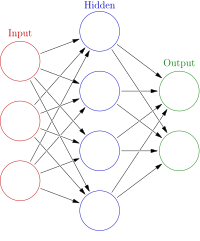
Photo from wikipedia
Object tracking is a technique for tracking a specific object appearing in a video sequence while observing its features or changes. Recently, many algorithms showing high performance have emerged by… Click to show full abstract
Object tracking is a technique for tracking a specific object appearing in a video sequence while observing its features or changes. Recently, many algorithms showing high performance have emerged by applying the Siamese network to the object tracking field. A Siamese network is designed to learn the similarity between two images. In object tracking, the Siamese network tracks the object by finding the location most similar to the target image in the search image. Algorithms based on Siamese networks are vulnerable to partial and total occlusion of objects. In addition, since the object is tracked using only the similarity with the image obtained using the ground-truth bounding box of the first frame, if an object is missed once, then errors are accumulated, and a situation where the object drifts away from the object of interest frequently occurs. Therefore, in this paper, we propose a reinforcement learning model that can maximize the reward for tracking success after partial and total occlusion of an object. We also propose a dynamic template exchange method using a template that has been successfully tracked in a recent frame to solve the drift problem. When the proposed model is applied to the existing tracking models to evaluate the quantitative performance in representative object tracking benchmarks VOT2018 and OTB50, it is confirmed that the accuracy is improved, and the number of tracking failures decreases compared to the existing method. As a result, an accuracy of 0.618, robustness of 0.234, and expected average overlap (EAO) of 0.416 are achieved in VOT2018, and success of 0.673 and precision of 0.881 are achieved in OTB50.
Journal Title: IEEE Access
Year Published: 2022
Link to full text (if available)
Share on Social Media: Sign Up to like & get
recommendations!